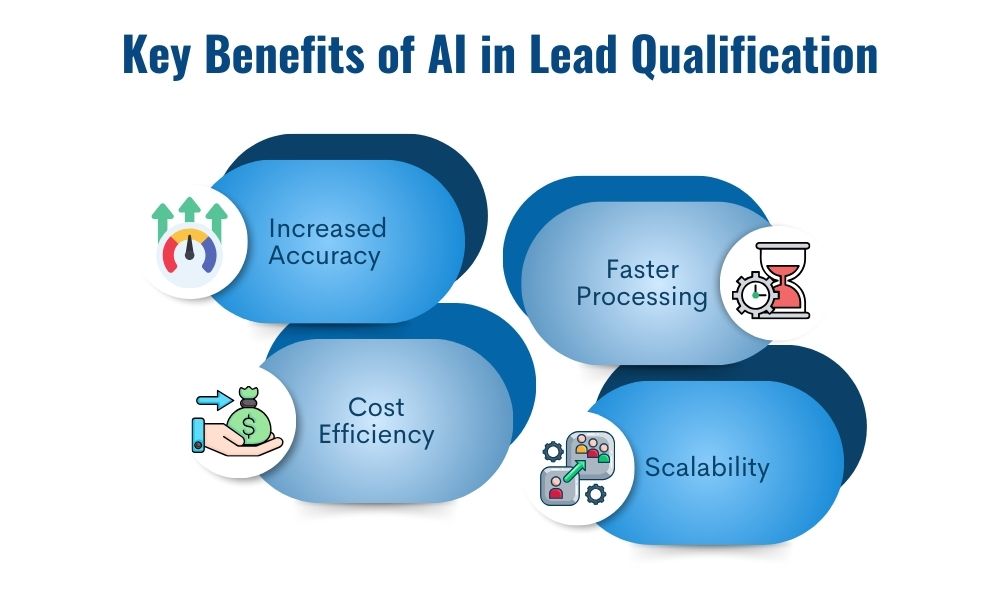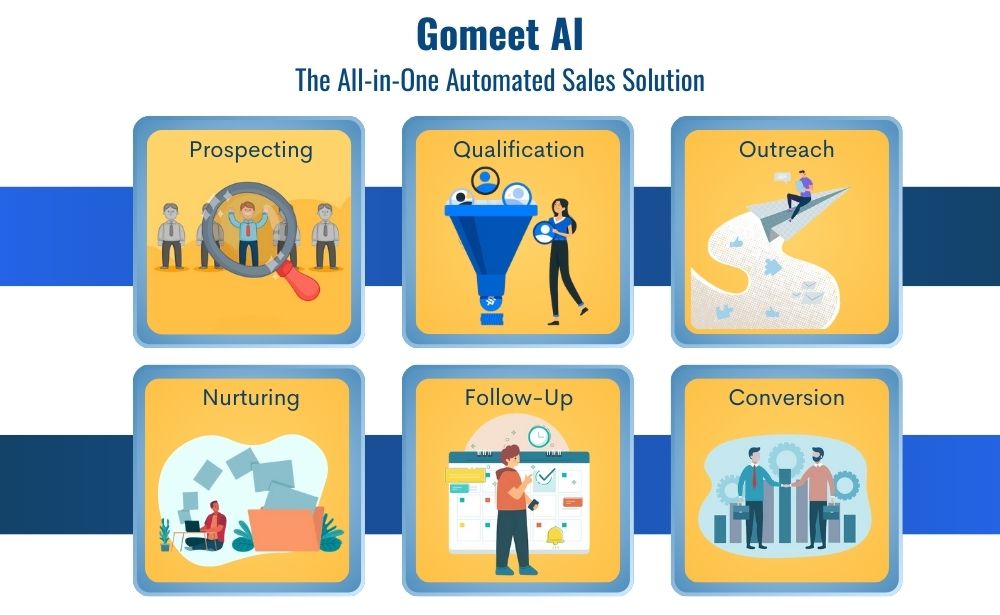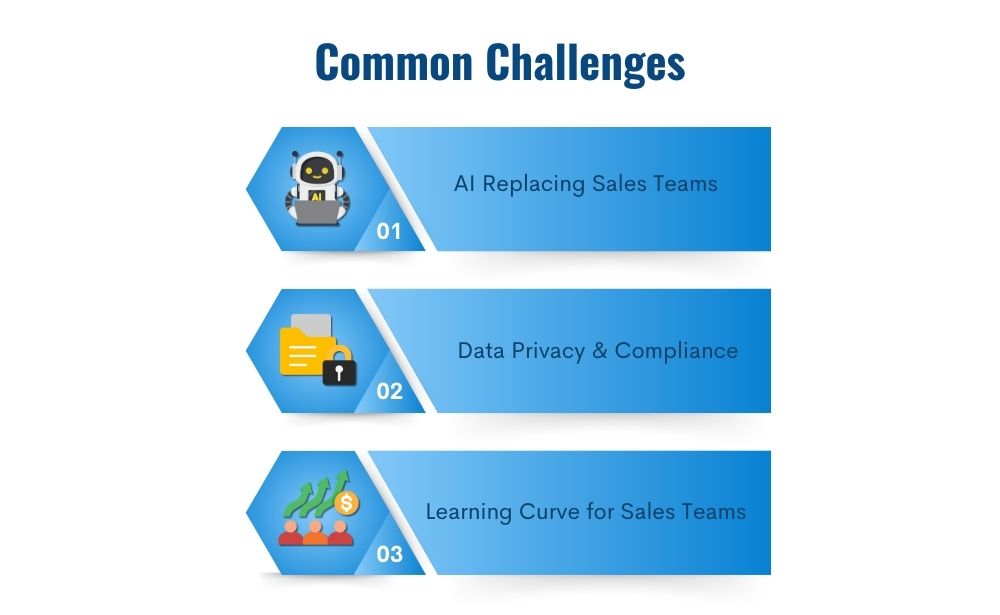“Time is the ultimate currency in sales—and wasting it on unqualified leads is no longer an option.”
Gone are the days when sales teams relied on instinct or hours of manual labor to qualify prospects. The advent of AI-powered tools has transformed lead qualification into a precise science, automating what was once a labor-intensive process. AI-driven solutions not only expedite the lead qualification journey but also deliver more accuracy, helping businesses prioritize high-potential leads. These AI tools are rapidly changing the B2B sales landscape, allowing teams to automate, scale, and drive higher conversions with data-driven insights.
What is AI-Powered Lead Qualification?
AI lead qualification is the process of using artificial intelligence and machine learning to evaluate leads based on multiple data points such as behavior, demographics, and engagement history. Traditionally, lead qualification has been a manual and time-consuming task. Sales teams would rely on human judgment, often making decisions based on incomplete data or gut instincts. AI changes this by analyzing vast amounts of data in real-time, providing sales teams with insights that help them prioritize high-quality leads.
- The Science Behind AI Lead Qualification
At its core, AI lead qualification uses machine learning algorithms to identify patterns and predict which leads are most likely to convert into customers. It analyzes past behavior, engagement metrics, and even external data such as social media activity. By comparing this data with historical success patterns, AI can create lead scores, ranking prospects based on their likelihood of conversion.
- Why It Matters
The primary advantage of AI-powered lead qualification is its ability to streamline the process, improving efficiency across the sales team. By automating lead scoring and prioritization, sales teams can focus on the most promising leads, increasing the overall success rate. AI also helps reduce human error and bias, ensuring that the lead qualification process is as objective and accurate as possible.
The Evolution of B2B Sales
- Old vs. New: From Gut Instincts to Data-Driven Decisions
Before AI, B2B sales relied heavily on traditional methods like cold calls, manual follow-ups, and lead qualification based on gut instincts. Sales representatives would sift through lead lists, spending time on tasks that offered no guarantee of conversion. This process was often inefficient, with many leads going cold or being misqualified.
Today, AI sales prospecting software has revolutionized the landscape. Instead of relying on intuition, AI tools provide real-time insights and data-backed predictions. The guesswork is eliminated, replaced by precise algorithms that score leads based on their behaviors and potential to convert. Sales reps no longer need to rely on gut feelings; they have data-driven recommendations guiding their actions.
- AI’s Role in B2B Sales
AI plays a crucial role in helping sales teams prioritize their time and resources. Tools like B2B prospecting software automate the process of identifying and nurturing potential clients, allowing sales teams to focus their efforts on leads most likely to result in successful deals. AI sales prospecting software helps companies target the right leads at the right time, increasing the likelihood of conversion and reducing wasted time on unqualified prospects.
Key Benefits of AI in Lead Qualification
- Increased Accuracy
AI’s ability to process and analyze massive datasets allows it to make more accurate predictions about lead quality than any manual process. This leads to improved lead scoring and ensures that sales teams are focusing on high-potential prospects.
For example, AI tools can analyze not only how frequently a lead engages with a company’s marketing materials but also how deeply they interact with specific types of content. Leads who read whitepapers or case studies, for example, are often much more qualified than those who simply open an email.
- Faster Processing
Manual lead qualification is slow. AI, on the other hand, can evaluate leads in real-time, providing sales teams with up-to-date information. This speed ensures that leads are engaged at the right time, before they lose interest. By processing leads faster, AI helps sales teams respond to opportunities before they go cold.
- Cost Efficiency
Because AI reduces the time spent on low-quality leads, sales teams can focus on high-potential prospects, improving efficiency. This translates to reduced costs, as resources are used more effectively.
- Scalability
AI tools can manage far more leads than manual processes, making them ideal for growing businesses. Whether you’re managing a pipeline of hundreds or thousands of leads, AI scales with your business, ensuring that no lead slips through the cracks.

AI Tools Revolutionizing Lead Qualification
- B2B Prospecting Software
AI-driven B2B prospecting software is designed to help sales teams identify, nurture, and qualify leads with minimal manual input. These tools use a combination of predictive analytics, data mining, and behavioral tracking to provide real-time lead scores, helping sales teams prioritize prospects.
- AI Sales Prospecting Software
AI sales prospecting software takes things a step further by automating outreach as well. These tools can engage leads through email, chat, or other channels, qualifying them automatically based on their responses. For example, AI software might send a follow-up email to a lead who visited your pricing page and gauge their interest based on their engagement with the message.
- How Each Tool Works
Each AI tool comes with unique features. Some focus on behavioral analysis, while others emphasize demographic targeting or predictive analytics. For example:
- Outreach Automation: These tools send personalized messages at scale.
- Lead Nurturing: Some platforms automate lead nurturing, ensuring leads receive the right content at the right time.
- Sales Cadence Tools: These tools help sales reps automate follow-ups and stay consistent with outreach efforts.
However, With Gomeet AI, you can fully customize your AI Task Assistant to handle tedious, repetitive tasks in under 10 minutes. AI SDRs can independently prospect, qualify leads, and follow up based on your specific instructions, streamlining your sales process effortlessly. Want to see it in action? Watch the video at the end of the blog to learn more!

Hypothetical Examples of AI in Action
Case Study 1: Company X
Company X implemented an AI-driven lead qualification tool, which resulted in a 30% increase in qualified leads. By using AI to score leads based on behavior and engagement, the company was able to focus its efforts on the most promising prospects. This resulted in a 20% reduction in time spent on manual lead qualification.
Case Study 2: Company Y
Company Y adopted AI sales prospecting software to automate its outreach efforts. By automating initial contacts and follow-ups, the company saw a 40% increase in response rates, with an overall reduction in the sales cycle duration.
Addressing Common Concerns
- Will AI Replace Sales Teams?
A common fear surrounding AI in sales is the idea that AI will replace human sales teams. However, AI is not here to replace sales reps—it’s here to enhance their efficiency. AI handles repetitive, time-consuming tasks, freeing sales teams to focus on relationship-building and closing deals.
- Data Privacy & Compliance
Another concern with AI is data privacy. When using AI tools for lead qualification, it’s important to ensure compliance with regulations such as GDPR. Many AI platforms are designed with privacy in mind, and businesses should choose tools that prioritize data security.
- The Learning Curve
Implementing AI can involve a learning curve, but with the right training, sales teams can leverage these tools to their full potential. It’s crucial to invest in onboarding and training to ensure that the sales team is comfortable using AI tools.

AI Sales Prospecting Software: The Future of B2B Sales
- Long-Term Impact
AI-powered prospecting is set to continue evolving. As AI becomes more sophisticated, we can expect even more precise lead qualification and targeting. AI tools will continue to enhance sales teams by providing more insights, improving predictive analytics, and making lead qualification even more efficient.
- AI and Human Collaboration
In the future, AI and human collaboration will be key. While AI handles the heavy lifting of data analysis and automation, human sales teams will focus on building relationships and closing deals. Together, AI and humans will drive the next wave of sales innovation.
How to Get Started with AI Lead Qualification
- Choosing the Right Tool
Not all AI tools are created equal. When choosing an AI tool, it’s important to consider the specific needs of your business. Some tools are better suited for outreach, while others focus on lead scoring or nurturing. Evaluate your sales process and identify where AI can add the most value.
- Implementation Tips
Successfully implementing AI in your sales process requires planning. Start small by automating a single part of your process, such as lead scoring or follow-ups. As your team becomes comfortable with the tool, you can expand its use.
- Training Your Team
AI is only as good as the people using it. Invest in training to ensure your sales team understands how to use AI tools effectively. The better your team understands the technology, the more they can leverage it to improve their sales outcomes.
Conclusion
AI is transforming lead qualification from an art into a science. By automating manual processes, improving lead accuracy, and scaling prospecting efforts, AI tools are revolutionizing the way B2B sales teams operate. If your business hasn’t yet explored AI tools for lead qualification, now is the time. With AI, you can gain a competitive edge in the fast-paced world of B2B sales.

